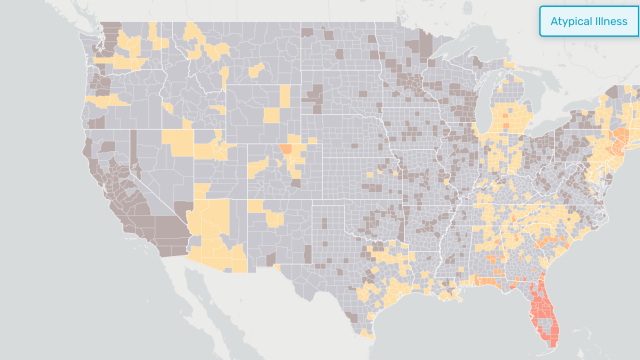When it comes to tracking the spread of one of the worst pandemics in recent memory, personal privacy has taken a bit of a backburner. It’s resulted in some pitches that are leaving some tech sceptics more than a bit uncomfortable—like sharing our mobile phone’s location data with the federal government, or mandating app downloads to track quarantined or soon-to-be quarantined users.
The latest pitch, evidently, is asking smart health devices to do the same. Recently, one manufacturer, Kinsa rolled out a nationwide map of “seasonal illnesses” nationwide. As the company explained:
The map shows two key data points: (1) the illness levels we’re currently observing, and (2) the degree to which those levels are higher than the typical levels we expect to see at this point in the flu season. We believe this latter data point—which we’re calling “atypical illness”, may in some cases be connected to the COVID-19 pandemic.
These data points are aggregated from the company’s network of “more than one million” smart thermometers being popped into the mouths of parents and children in houses and schools nationwide. And the data may be useful when it comes to tracking cases of covid-19 infection while the U.S. is still experiencing inadequate testing and an overwhelmed health care system that’s incapable of taking care of citizens during normal times.
On one hand, it’s concerning that smart thermometers are leaking so much data, but on the other hand, this is an example of connected stuff actually…….maybe……helping https://t.co/2HnPnESn9i
— Internet of Shit (@internetofshit) March 23, 2020
Devices like these—smart thermometers, smart blood pressure monitors, smart toothbrushes, and the like—are being manufactured at a breakneck pace, with some of the biggest names in tech like Apple and Google fighting to get their slice of what’s shaping up to be a lucrative market over the next few years. But for all of the money being spent, these companies aren’t the best at manufacturing trust, with more than half of Americans reportedly wary about these devices and their propensity for being less than secure.
Which brings us back to Kinsa. If you read its self professed “privacy principles,” the company mentions that it doesn’t just use its data to track pandemics, but to “help companies direct their marketing to sicker areas only if their products are proven to improve public health.” In the past, this meant passing off its “anonymised” data to companies like Clorox, who are just as concerned with halting the spread of COVID-19 as they are with getting you to spend your money on Clorox products. And that’s not mentioning the other pharmaceutical companies that get their hands on Kinsa’s consumer data for… well, any reason they want, really.
The real question with products like Kinsa isn’t whether they’re violating our privacy—we already know that they are, and they’ll continue to do so, the way they always have. The question we have to ask is whether the tradeoff—and being able to map out the coronavirus’s spread—is worth it.
